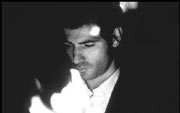IN PRAISE OF LOVE
written and directed by Jean-Luc Godard
runs Oct. 11-17 at Varsity
IN A TIME when French cinema—forget Hollywood for the moment—is represented by contemporary kickboxing in Wasabi and period kickboxing in The Brotherhood of the Wolf, Jean-Luc Godard retains his cranky, compelling concerns for art, history, film, and the forever contested ground between men and women. In Praise of Love is his first feature since the 1996 Forever Mozart (which reached Seattle in ’00), during which time he’s mainly been producing short works on video. Appropriately, Love is actually two short movies—the first shot on gorgeous black-and-white 35mm, the second on oversaturated color DV—adding up to about 98 minutes of philosophical musings and rueful romanticism.
It’s the latter quality that stays with you as Godard surveys the current, fallen state of the world with mournful resignation. Love is talky like all late Godard, packed with maxims, aphorisms, and quotations, but somehow all that chatter becomes so much background noise to the images of Paris (in Part I) and windswept coastal Brittany (in Part II). “The days of phrases are over,” admits director Edgar (Bruno Putzulu) on Godard’s behalf. Indeed, this passive, impotent surrogate figure has rather little to say; when he flips through his notebook, it’s literally blank of ideas.
Edgar vaguely describes a “project” that he hopes to film, a study of the four phases of love between youth and senescence. Part I is thus essentially a movie about the making-of-a-movie, as he and his cronies scout locations and interview actors. But it’s also a kind of travelogue, a pictorial tour of Paris ࠬa Atget or Brassaver rain-slickened cobblestones. (Here you may experience a certain nostalgia for the vintage nouvelle vague Godard.) While sitting, dining, and driving around, there’s a photogenic languor to the proceedings. Edgar’s film can’t get off the ground, and no one—least of all him—seems much to care.
WHILE CASTING HIS project, Edgar doggedly pursues a nonprofessional actress, Berthe (C飩le Camp), who cleans subway cars for a living. She rebuffs him at every turn, and it’s hard to understand where their apparent familiarity comes from. (Are they ex-lovers, ex-spouses, or what?) Jumping ahead to Part II (which takes place two years earlier), it emerges that he met Berthe while interviewing her grandparents as part of yet another vague project—this time on the French Resistance. Did he fall in love with her? Not exactly.
It’s more like he’s impressed by her forceful outspokenness, as when she tells off the crass Spielberg reps who are buying the rights to her grandparents’ life story: “With no history, you have to seek it elsewhere!” Unlike poor passive Edgar, Berthe stands up for something; she has principles—if not the glamour that Godard once valued in Anna Karina.
Godard pointedly contrasts Edgar’s artistically exhausted approach to (non) filmmaking in Part I with the paintings that are often lugged around from room to room. Cinema becomes the bastard stepchild of the arts. Love‘s classical score, plus repeated images of statues and Parisian architecture, contributes to a sense that Europe’s fading cultural legacy is overmatched against war, globalization, and the almighty dollar. It’s a losing battle, and love is no less doomed.
Yet Godard doesn’t seem as angry or disgusted as in previous films. At 71, perhaps he’s reached the age where decay begins to look like the status quo. In Part I, posters for Robert Bresson’s Pickpocket and The Matrix stand side by side; Continental past and American present now exist uneasily together, as even Godard is forced to admit. Love isn’t a rant but an elegy.
When Berthe drives Edgar homeward with rain beating hypnotically against their windshield at the end of Part II, he finally mentions a lost love that perhaps inspired his whole subsequent romantic inquiry. Berthe hasn’t replaced that love (they never do more than talk), but a bond has formed that haunts him. Was she the one? Did I let her get away? When they meet again in Part I, he isn’t so sure; maybe it’s just the idea of love that he longs for.
Which is it? Godard isn’t telling. He’s brainy, sure, but don’t say the guy has no heart.









